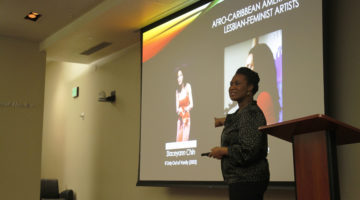It took everything in me not to burst into tears last Wednesday after the election. While driving in my car I saw a “Yeah, Trump!” bumper sticker, and I got sick to my stomach. I walked onto campus in a rage, vowing if I saw one Trump supporter yelling at me, I’d probably punch them.
Then I realized what I was doing. I was feeding into the hatred that they — meaning the racist, misogynist, queerphobic crowd that Donald Trump has seemed to attract — wanted me to feel. I found myself taking a step back to evaluate my own character, and in the midst of all the social-media madness surrounding the election, I’d like to bring this to everyone’s attention.
There are arguments floating around that the protesters have no right to do so, seeing as their rights have not been violated. There are people telling us who are grieving over the results to “stop whining,” to “quit complaining” and to otherwise silence our concerns. I have already had people send me video clips of supposed Clinton supporters beating up Trump voters under the statement that both sides are just as violent as the other. With all of this negativity spreading rapidly across our mobile phones and computer screens as well as in person, there’s something I feel we need to remember:
Trump supporters are human.
I’m pretty sure half of my own family voted for Trump, even when they knew I was LGBTQ+ and out publicly. They’ve seen my Facebook posts about queer rights. I’ve engaged in countless discussions with them about it, yet they still decided to cast their votes for a xenophobic, ableist, homo/transphobe.
This information hurts, but what I had to recognize is that it didn’t mean my family loved me less; it just meant I failed to educate them properly.
It’s no secret the LGBTQ+ community has experienced all kinds of discrimination for decades, but there is a group of people out there that believes our fight for equality ended with the legalization of same-sex marriage. The hard reality is that our struggle continues. Here are some statistics gathered within the past few years:
According to the National School Climate Survey conducted by the Gay, Lesbian & Straight Education Network in 2013, 85 percent of LGBTQ+ students reported being verbally harassed in school. Thirty-nine percent were physically harassed and 59 percent reported being sexually harassed.
The National Coalition of Anti-Violence Programs released a report in 2014 documenting an 11 percent increase in homicides against LGBTQ+ people, with 80 percent of those victims being people of color.
The FBI released its most recent hate-crime statistics in 2014 as well, stating there were 1,178 reported hate crimes based on sexual orientation, with 109 based on gender identity.
Why am I telling you to consider these facts? Because they aren’t even current. I’ve done the research, and I’ll say it’s difficult to find numbers for 2015, much less 2016, and the work of digging through the long lists of sexual assaults, homicides and suicides is a daunting, disheartening task. This isn’t taking into account the anti-LGBTQ+ legislation passed in North Carolina this year either that prohibited transgender people from relieving themselves in the bathroom they identified with or the Orlando shooting we of the queer community will not soon forget. We’ve taken a giant step backward in our collective psychology toward the LGBTQ+ community, and if the statistics I’ve cited don’t worry you, here’s a little glimpse into what it’s like to be queer right now.
You walk outside with your partner to get into your car. You hurry because you can already feel your neighbor in apartment 3 staring you two down through her window. You start the car and leave. You roll the window down for some air but quickly roll it back up at the stoplight because the last time you did that, the person next to you shouted slurs at you. You get to the bar for your date night and upon sitting down, you notice a man at the counter glaring at you two. He approaches your table and attempts to flirt with both of you but ends up saying vulgar things about what he’d like to do to your bodies instead. When you tell him you’re not interested and that you’re taken, he responds with “that’s hot” and asks for a threesome. You both get up to leave and he follows you outside. Your partner realizes they forgot their phone, so you both scramble to retrieve it inside. He’s still there when you come back out and tells you you’re cute together, to which you smile, nod and run to your car. Breathing a sigh of relief, you go home, trying to laugh it off the entire way back, although you both know the interaction could have taken a much darker turn.
Now rinse and repeat.
Those events are not fabricated either. For many of us, this is a daily reality we have to face when we wake up in the morning. The stares, the slurs, the harassment — it’s a constant battle to survive, mentally and physically.
What I’ve realized in light of the election and the rise of hate crimes within the past week is that the hate I’ve had to endure isn’t a consequence of politics; it’s a result of poor education. If you voted for Trump, I commend you for doing your duty as a citizen of the United States. Even if you abstained from the vote, I don’t hold anything against you. What I am urging everyone to do is listen.
We are afraid, and our feelings are valid. Some of us have experienced hatred our entire lives, and with someone who has spewed that same hatred throughout the majority of his campaign rising to the most powerful position in our government, we have every reason to be afraid. Instead of bashing protesters for taking to the streets, take a moment to try and understand why they are protesting. It’s not because our rights have been violated; it’s because we’ve never had those rights in the first place, and I’m not just talking about marriage equality. I’m talking about the right to be ourselves, openly and unashamedly, without the fear of getting assaulted or murdered for it.
But I also am encouraging everyone, not just the LGBTQ+ community, to respond to hate with understanding as well. If we don’t educate people, they will never know the reason why our fight is so important. Even Michelle Obama said, “It’s easy to see this country as ‘us’ versus ‘them,’ and it’s easy to dehumanize them — to treat them with contempt — because you don’t know them.” We need to take a stand, not only for equality but for understanding. We need to be reaching out to our fellow Americans on opposite sides of political parties with a desire for empathy. Let’s take these next four years to get to know each other again and to learn how to walk in one another’s shoes.
I know we can do this. So who’s with me?












